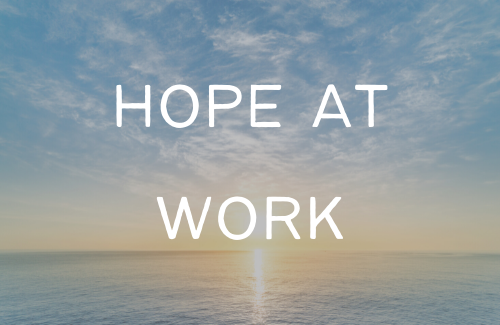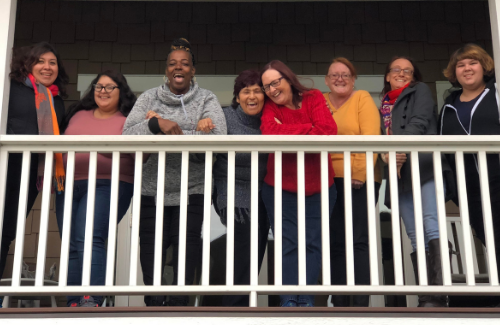Hope at work
The explosion of information from neuroscience in the last decade has built a solid foundation for how humans can create and maintain resilience. What hasn’t been so clear, until recently, is how to create and maintain resilience in groups—teams and organizations.
It is well documented that high stress, fast-paced workplaces create burnout and victimized, non-productive behaviors in employees. Individual resilience isn’t sufficient to maintain healthy individuals or the workgroup they belong to. Resilient individuals simply endure longer before they, too, burn out in fast-paced, high productivity workplaces. Last one out, turn off the lights.

The over-focus on individual resilience as a solution to organizational health is aligned with the “rugged individualism” of industrialized nations—if you try hard enough you, too, can be successful, pull yourself up by your bootstraps, stay strong, get ahead, and your health is your responsibility - all messages that “you’re with us, but you’re on your own.” That’s a very new, and harmful, recipe for success in the history of cultures around the world. Older cultures often took the perspective that the health and success of an individual can’t be separated from the health and success of the group. It takes all of us, working together, to maintain our health as a culture.
Our Approach
Teams stay hopeful and resilient through the use of activities—designed by the team—and integrated into the ongoing work life of the group. These “ritualized” activities form a foundation of resilience that keeps the work team hopeful, inspired, productive, and communicating in ways that build a positive and collaborative work environment. Since the culture of each group is different, the activities they design will be uniquely aligned with what their group needs to maintain hope and resilience.
The model we use includes four key focus areas necessary to build and sustain a healthy group. We will describe these four focus areas, provide an overview of why they are necessary, and give examples of activities in each area. Using our Hope Quick Assessment© evaluation tool, you will have the opportunity to assess your current workgroups levels of hope, identify strength and improvement areas, and decide on the most critical areas to focus on. We’ll provide the tools and templates for your group to use as it decides on the activities that will best work for them. This training WILL make you more hopeful about the future of your workplace.

This is not a quick-fix solution. Hope isn’t built in a day. It is designed for groups who are invested in individual health as well as the health of the group, are willing to invest short amounts of time during regular staff meetings to both create and carry out resilience-building activities they design, and believe—no matter what the circumstances are around them—that hope and resilience on their team is worth creating. The significant act of committing to group hope and resilience starts the process and, over time, groups begin to notice significant changes as they engage in activities. This model does not require additional staff meetings or retreats to be successful.

Format
This learning event is a mix of:
- Foundational information from neuroscience and cultural perspectives on hope and resilience in individuals and groups
- In-depth description of the action model your group can use to build hope and resilience
- Small and large group discussions so you can see how your organization compares to others
- Use of our assessment tools and templates for action planning.
Participants can expect:
This training will focus on the information and tools your group can use to build a hopeful and resilient work culture:
- Identify differences between hope, resilience, and optimism.
- Learn the two primary methods humans use to create resilience
- Identify the four action Domains necessary to build group hope and resilience
- Review the 12 most common hope building activities.
- Participate in 4 demonstration activities during the day.
- Review more than 75 hope-building activities other groups have used
- Complete the Hope Quick Assessment for your group
- Identify hope strengths and weaknesses in your assessment.
- Identify typical resistance to healthy rituals and strategies to overcome.
Who’s invited?
Helping professionals, organizational leaders, managers, department heads and development consultants, health-promotion specialists, diversity/equity leaders and consultants, and community encouragers of all kinds are invited to participate. There is no preparation necessary.
Participation requirements:
- Participants must be able to connect to Zoom with both audio and video.
- This is a highly interactive learning event. It is not the kind of session where you can do other tasks while engaged with us.

Date and Time
Next Session Spring 2024
9am-4pm PDT
12:pm-7:00pm EDT
This event can also be scheduled for your organization in your time zone. Contact us for more information.
Learning host
Bruce Anderson
Registration fee
$149.00 USD Single Registration
$300.00 30% Discount for 3 Registrations